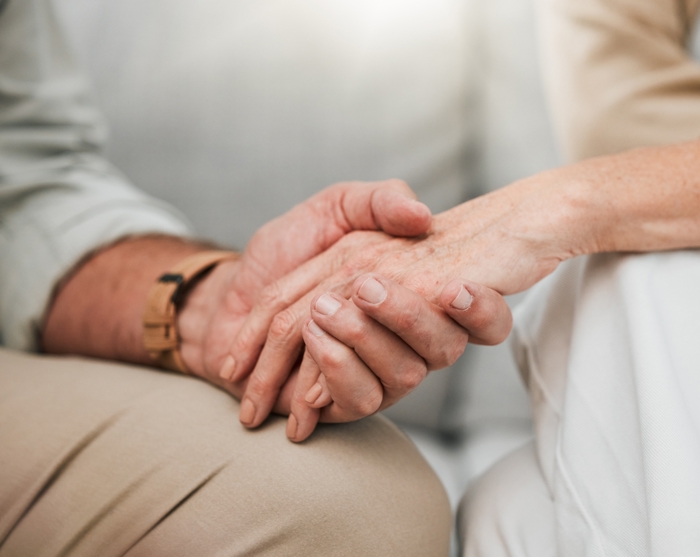Different reactions and feelings
Being the next of kin to someone who is terminally ill can be demanding both emotionally and practically. Strong emotions are perfectly normal, and it is easy to feel helpless.
It is also not uncommon to experience anticipatory grief. This can be as strong as the grief of the bereaved and often starts after a terminal diagnosis is made. Many people may feel that they are losing the person before they die. Grieving for someone who is still alive can be difficult.
Many will experience new and unknown aspects of themselves and the person who is ill. The situation often requires a major adjustment, and it can take time to find a new balance in your everyday life.
The right to medical care
In order for you and the person who is terminally ill to receive the best care and support in the time you have left together, it is important that you, as next of kin, know the patient’s rights to the necessary health and care services.
The Health and Social Services Ombudsman can provide advice, guidance and assistance in your dealings with the health service.
A need for respite care
As a caregiver for a terminally ill family member, you may need respite care to avoid becoming overburdened.
Respite care can be provided in your own home or as a stay at an institution. Support can also be provided as practical assistance or in the form of technical aids.
Read more about support and relief for next of kin who are caring for someone with demanding care needs here.
Financial Support and Counselling
Long-term illness can often lead to reduced income and increased expenses for the family. It is important to get to grips with your financial situation and find out what support schemes are available. Some hospitals offer advice and guidance from a social worker. You can also contact NAV.
Both patients and caregivers may be entitled to financial support. There are several benefit schemes that caregivers can apply for such as:
Remember to take care of your own health
As the next of kin of someone who is terminally ill, it means a lot that the terminally ill person has the best possible quality of life. However, you also need to take care of yourself and your own health. Of the many ways in which you may react in a challenging situation, you may:
- be worried, stressed or afraid
- be struggling to sleep
- lack energy and stamina
- fall sick or tire easily
How to take care of yourself in the best possible way depends on your situation, but you can:
- try to be open with friends and relatives about how you are feeling
- try to set aside time for physical activity and things you like to do
- eat healthily and regularly
- try to get enough sleep.
- find out about symptoms and treatment
- contact a patient and peer organization or voluntary organization
- talk to a representative of a relevant religious and life stance community
If you have your own health issues and symptoms of illness and need health care, you are advised to consult your GP.
Contact with health professionals for next of kin
As the closest next of kin to a person receiving end-of-life care, it is only natural to have many questions and a strong desire for information. It is important that you talk to the health professionals in charge of the terminally ill person’s treatment.
You can also talk to them about spiritual and existential thoughts and questions. When provided with the terminally ill person’s traditions and cultural affiliation, the health and care services will more easily take these into account in the final phase of life.
It may also be important to talk to a health professional alone without the person who is terminally ill being present.
Your right to information
As next of kin, you have the right to information insofar as the person concerned grants permission, i.e. consent. For example, this may concern pain relief, discontinuation of hydration and nutrition, or expected changes until death occurs. Or the needs you yourself have as next of kin.
If the person who is terminally ill cannot safeguard their own interests and lacks the capacity to consent, you, as the next of kin, have the right to information about the person in question’s state of health, treatment and care. You also have the right to express your opinion about what treatment you think the terminally ill person would or would not have wanted.
The Health and Social Services Ombudsman
The Health and Social Services Ombudsman provides patients and next of kin with advice, guidance and assistance in their dealings with the health service. All assistance is free of charge and the Ombudsman has a duty of confidentiality.
The Norwegian Cancer Society
The Norwegian Cancer Society can provide information, tips and advice to next of kin, and have counsellors who you can talk to.
The Dementia Helpline
Get advice from professionals about dementia, or talk to other caregivers.
The Norwegian Heart and Lung Association (LHL)
LHL is an organisation working for people with heart, vascular and lung disease, allergies, stroke, aphasia and their next of kin.
PIO-Pårørendesenteret
National counselling helpline for next of kin regardless of diagnosis.
The content has been provided by the Norwegian Directorate of Health in collaboration with the Norwegian Cancer Society, the National Association for Public Health, the Norwegian Brain Tumour Association, the Council for Religious and Life Stance Communities in Norway, etc.
